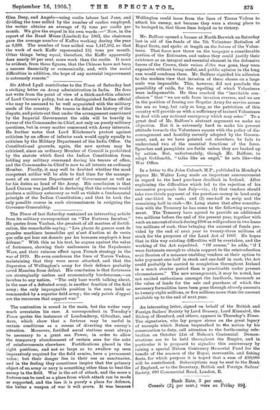The contention is sound in the main, but the writer
very much overstates his case. A correspondent in Tuesday's Times quotes the instances of Londonderry, Gibraltar, and Acre, which show that a fortress may be useful in certain conditions as a means of diverting the enemy's attention. Moreover, fortified naval stations must always be necessary to a great sea Power, in order to allow the temporary abandonment of certain seas for the sake of reinforcements elsewhere. Fortifications placed in the right positions, and not so large as to swallow up men imperatively required for the field armies, have a permanent value ; but their danger lies in their use as sanctuaries, and in the feeling they sometimes inspire that the primary object of an army or navy is something other than to beat the enemy in the field. War is the art of attack, and the more a fortress can be used as a place from which attack can be made or supported, and the less it is purely a place for defence, the better a weapon of war it will prove. It was because Wellington could issue from the lines of Torres Vedras to attack his enemy, not because they were a strong place to be besieged in, that those lines helped us to victory.










































 Previous page
Previous page